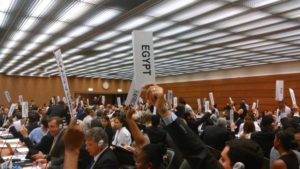June 23, 2017
Gaukhar Mukhatzhanova and Andrea Berger
On June 7, 2017, the James Martin Center for Nonproliferation Studies (CNS) of the Middlebury Institute of International Studies at Monterey brought together thirteen experts for a one-day workshop “stress testing” the draft convention to ban nuclear weapons. The exercise was designed to examine key provisions of the draft, identify potential problems in terms of their implementation, compatibility with other existing instruments and practices, and reactions of states not participating in the negotiations, and seek possible solutions. The organizers did not seek to forge consensus among the participants but rather generate discussion and proposals on ways to address the issues raised by the experts. Participants were also asked to set aside their views on the desirability of a convention as a whole, and instead assume that a ban, as currently drafted, was concluded and opened for ratification. As a result, the views presented in this report are not intended to serve as arguments for or against a convention banning nuclear weapons.

The Open-Ended Working Group votes to begin negotiations on a treaty banning nuclear weapons on August 19, 2016. Photo credit: Xanthe Hall for the International Campaign to Abolish Nuclear Weapons
The areas that the workshop covered were: core prohibitions, safeguards/verification, provisions for nuclear-armed states’ accession, national implementation, relationship with other treaties, and potential amendments. The articles that were discussed therefore are: Articles 1.1.a, 11.e. and 1.2.a. (General Obligations); Article 3 and Annex (Safeguards); Articles 2, 4 and 5 (Declarations, Measures for States that have eliminated their nuclear weapons, and Measures for situations not covered by Article 4); Article 7 (National implementation), and Article 19 (Relations with other agreements). Workshop participants also had a chance to raise other issues not covered in the agenda. The following is a report on the discussion and proposals that emerged from the workshop.
